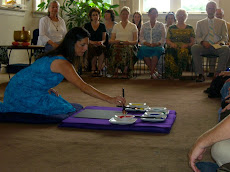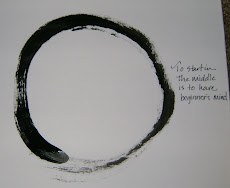I have been thinking about how ritual plays a part in reflection, repetition, and compassion and vice-versa. All three components are important parts of my own world, and they play out in my classroom frequently.
I finally wrote up my notes from the Mind Life XIX Conference I attended last November in Washington, D.C., along with several other Naropites. The Conference entitled, Educating World Citizens for the 21st Century: Educators, Scientists, and Contemplatives Dialogue on Cultivating a Healthy Mind, Brain, and Heart. The Conference was composed of four sessions, and HH the Dalai Lama sat in on each one.
I can't remember who said it during the first session of the Conference, but I wrote in my notes:
Compassion = Empathy + Reason
Then I wrote:
In order to increase the growth of national happiness, we need a "compassion gymnasium." It takes mental training and control of the mind to cultivate compassion and loving-kindness. i.e. training for a marathon: you cannot run 26.2 miles if you are not in shape.
In cultures where compassion is built in, they just "get it." But when it's not built in, children need to be taught.
We are just coming up to the end of our third quarter at school next week. I have been marveling at the growth of my students. They are thoughtful, creative and caring souls. They thrive on repetition and the structure it offers. Most of them are capable of reflecting deeply and critically. They demonstrate compassion in ways I would never have expected, and I am awed that they are able to rise to all of it in their sixth grade year. Today, after school, I simply sat at my desk and wept. The tears were of joy, tinged by the suffering that each of my students so bravely - so maturely - dealt with today, and so often demonstrate in their discussions, written work, and actions.
In Shambhala: The Sacred Path of the Warrior, Chogyam Trungpa Rinpoche explains:
The genuine heart of sadness comes from feeling that your nonexistent heart is full. You would like to spill your heart's blood, give your heart to others. For the warrior, this experience of sad and tender heart is what gives birth to fearlessness. Conventionally, being fearless means that you are not afraid or that, if someone wants to hit you, you will hit him back. However, we are not talking about that street-fighter level of fearlessness. Real fearlessness is the product of tenderness. It comes from letting the world tickle your heart, your raw and beautiful heart. You are willing to open up, without resistance or shyness, and face the world. You are willing to share your heart with others (Trungpa, 1984, p. 32).
My students are warriors.
During the fall semester, I gave my students a piece written by Mother Teresa (we affectionately refer to the piece as "Mother T"). There are nine phrases that make up the piece, and we learned it phrase by phrase - one new one each week. We started with the first phrase and recited each day for a week. Then then students would write a reflection on the phrase - what it meant to them, personally, how they had experienced it in their lives, and often they reflected on how this phrase fell into the world picture. The following week, wee would recite the first two phrases every day, reflect again on the second one, and so on. Here is a copy of the piece:
People are often unreasonable, irrational, and self-centered.
Forgive them anyway.
If you are kind, people may accuse you of selfish, ulterior motives.
Be kind anyway.
If you are successful, you will win some unfaithful friends and some genuine enemies.
Succeed anyway.
If you are honest and sincere people may deceive you.
Be honest and sincere anyway.
What you spend years creating, others could destroy overnight.
Create anyway.
If you find serenity and happiness, some may be jealous.
Be happy anyway.
The good you do today, will often be forgotten.
Do good anyway.
Give the best you have, and it will never be enough.
Give your best anyway.
In the final analysis, it is between you and God. It was never between you and them anyway.
~ Mother Teresa
*The students were told that if they weren't comfortable with the word "God," they could substitute it for another word, i.e. "good" or "Universe" or not say anything at all.
My students know the entire Mother T piece by heart. Two weeks ago we began re-visiting the piece. I posted "Phrase One" up on the white board for the week. I asked the students to reflect in their journals on the first phrase and how they have incorporated it into their life since we began working on the piece in the fall. This second week, we did the same. Next week, we will do the same again, and so on until the piece runs it's course.
The repetition of reading and verbally saying the piece out loud (and in unison) has helped the students (and myself) learn the piece, so that now, at this point, it seems to be a "part of us." The written reflections (and subsequent discussions), have helped us all think about our thoughts and our actions - has given us pause about how we look at others, ourselves, and how we can make choices about our attitudes and actions.
Saying the Mother T piece out loud, as a group, seems to be a uniting force. The students say it together, and if one falters, the others help get him/her back on track. The voices, in unison, reverberate the message of the piece. To hear twenty-two sixth graders recite this, just about breaks my heart into twenty-two pieces of love (regardless of how sappy that sounds, if you heard them, I have no doubt that you might experience the same).
The practice of speaking the piece daily last fall was more than a practice: it was a ritual. The meaning behind it were the words themselves and what the students got from them. The creation of a unified body of students who were (and still are) creating a cohesive community was enhanced by the words, sounds and reverberations of saying the piece out loud and together. The connections that students have made between themselves and the piece and themselves and the world are clear, as seen in their written reflections, discussions, and actions. Re-visiting the piece now, fortifies those connections.
In the third session of the Mind Life Conference, Matthieu Ricard explained that "Compassion must be cultivated through practice." and Martin Brokenleg offered the literal translation of "child," in his native language (forgive me, I cannot remember what tribe he is from):
"Child" means "One who stands sacred." Brokenleg went on to express what he believed a child's mental and emotional needs are:
- A sense of Belonging: with parents, society, and land
- A sense of Mastery: what a child is capable of doing
- Being responsible for self: good behavior, good thinking
- Generosity: being a part of the world, giving to the world
The Mother T piece and how we practice it in Room 503 (my classroom) seems to provide a platform where all four points above can be cultivated.
I have more thoughts on repetition, reflection, and compassion, and I will continue to write about them in the coming days.
Lizard Coloring Page
2 years ago





3 comments:
Thank you. This was a profoundly lovely entry! You share the spaciousness of your heart with your readers today.
You are making such rich connections among all those "random" contributors to your personal contemplations. It's like you gathered a bunch of stuff while reading, working, walking, and communing with others... things that your increased awareness led you to intuit were important, even if you couldn't rationally explain why in that moment... and you put them all in a giant sack, a la Santa's sack... and now you are taking them out, one by one, and arranging them artfully in a beautiful new creation, in the shape of a 3D mandala (or is that taking the metaphor too far), in which they are not only all somehow interconnected, but their arrangement tells a story that reveals great wisdom.
You are a natural teacher. I learn everytime you observe something "outloud"... everytime you reveal something to yourself. You are my teacher.
Namaste'
"You are a natural teacher. I learn everytime you observe something "outloud"... everytime you reveal something to yourself. You are my teacher."
And you are mine, Joan.
In gratitude,
Nicky
Post a Comment